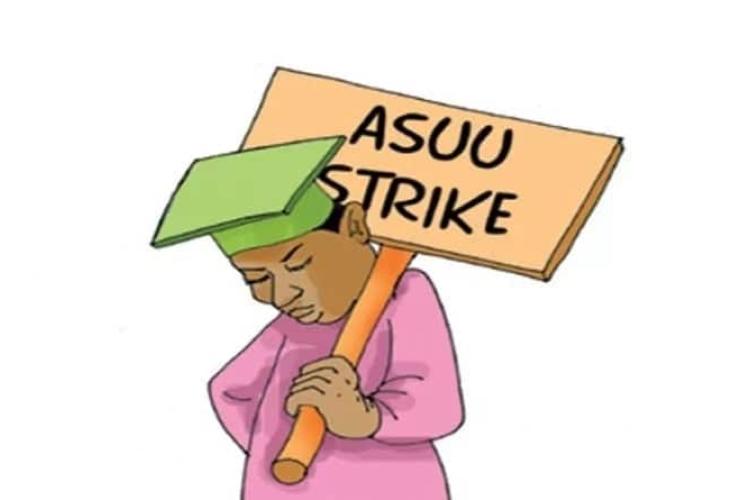Unless the federal government takes urgent steps, the nation’s universities could be shut down in weeks. This is because the Academic Staff Union of Universities (ASUU) has vowed to go on strike to press home the demands of its members.
Unfortunately, this development is coming after some months of relative stability and peace on our campuses.
This will be one strike too many given what our universities have passed through in the name of strikes and protests that border on disagreements with the federal government. We believe that our institutions of higher learning must be spared another round of disruption, as this is always inimical to teaching and learning.
We need stability in the education sector. At this time of unusual suffering in the land, we cannot afford to have our children back at home constituting additional problems for parents who are already stretched in the struggle for daily living. Also, it is quite tempting to push these young people to the streets now, with all the attendant ills that go with such. Our society has become a killing field, especially for the young ones, and we owe them the duty of care to see that they are not put in harm’s way.
- Hardship: It’s time to review your policies, PDP BoT tells Tinubu
- Plus Wallet Redefines Crypto Management with its Fast Listings & Rewards System While WallitIQ & Token Unlocks Shake Up The Market
Sadly, from all that has been said, the government does not seem to be forthright when it comes to negotiations with workers. We state this taking into cognisance what transpired when the government engaged with the Nigeria Labour Congress (NLC) and the Trade Union Congress (TUC) on the new minimum wage for the country. From the reports by the workers’ representatives, the talks were characterised by intrigues and arm-twisting tactics by the officials of the government. At the end of the exercise, the unions came out to accuse the government of not implementing some aspects of the agreements reached by both sides.
Now, this appears to be playing out in the ASUU case. In its notice of strike action, the university teachers’ union listed an array of government’s promises not kept, which obviously threaten the stability of the relationship between the two sides. The lecturers are employees of the government. Therefore, it is incumbent on their employer to show good faith in its dealings with them. But this does not seem to be the case, going by the facts presented by the union.
Their demands cover a number of issues, some of which have lingered since 2009. According to ASUU, the issues in contention include (a) conclusion of the renegotiation of the 2009 FGN/ASUU Agreement, based on the Nimi Briggs Committee’s Draft Agreement of 2021; (b) release of withheld three-and-a-half months’ salaries due to the 2022 strike action; (c) release of unpaid salaries for staff on sabbatical, part-time, and adjunct appointments affected by the Integrated Payroll and Personnel Information System (IPPIS); (d) release of outstanding third-party deductions such as check-off dues and cooperative contributions; (e) funding for the revitalisation of public universities, partly captured in the 2023 federal government budget; (g) payment of Earned Academic Allowances (EAA), partly captured in the 2023 federal government budget; (h) proliferation of universities by federal and state governments; (i) implementation of the reports of visitation panels to universities; (j) illegal dissolution of governing councils; and (k) University Transparency and Accountability Solution (UTAS) as a replacement for IPPIS.
Daily Trust is not ASUU’s mouthpiece, but as stakeholders in the Nigerian society, we are compelled to raise our voice in the face of what appears to be incontrovertible evidence of bad faith. From an impartial look at the union’s demands, it is clear that the government has been less than candid in its dealings with its workers in the tertiary institutions. The federal government continues to approve the establishment of more public universities; yet it does not seem to want to shoulder the responsibility of ensuring that the schools are properly funded. It is this “body language” of the government that makes ASUU believes that lack of funds is not the true reason for this state of affairs, as the government claims.
How can it be that the government would discuss issues with parties, and reach agreements with them, only for it to turn around and renege on the agreements reached? Since there was an agreement between ASUU and the government, the latter should show that it abides by such agreements. The government needs to change this disposition which suggests that it only engages in talks with citizens for the sake of talking, in the full knowledge that it would not implement any agreement reached at the end of such talks. This smacks of duplicity and impinges on the credibility of the government.
We call on the Minister of Education, on whose turf this battle is raging, to intervene. We are not in any way suggesting that all issues must be resolved or met in all cases of disputes at once. However, when the government engages in talks with its citizens through their representatives, it is incumbent on it to keep to the terms of agreements reached during such engagements. This is the path of honour, which will engender trust and foster hope in the citizens.

 Join Daily Trust WhatsApp Community For Quick Access To News and Happenings Around You.
Join Daily Trust WhatsApp Community For Quick Access To News and Happenings Around You.


